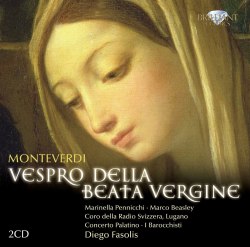|

|
Claudio MONTEVERDI (1567 - 1643)
Vespro della Beata Vergine (early 1600s)
Marinella Pennicchi, Anna Simboli (soprano); Roberto Balconi, Fabian Schofrin (alto); Marco Beasley, Luca Dordolo, Sandro Naglia, Giuseppe Maletto (tenor); Daniele Carnovich, Alfredo Grandini, Furio Zanasi (bass)
Coro della Radio Svizzeria, Lugano; Schola Gregoriana; Ensemble More Antiquo; Concerto Palatino; I Barocchisti/Diego Fasolis
rec. live, 24 June 1999, Lugano, Switzerland
BRILLIANT CLASSICS 94252 [72:13 + 25:17]
The Vespro della Beata Vergine belongs among the most frequently performed works in music history. The performances show great differences. Some include only the music which Monteverdi wrote, others add plainchant and sometimes other vocal and instrumental works in order to 'reconstruct' a Vesper service as it might have taken place in Monteverdi's time. Some performers go as far as changing the order from that found in the printed edition. The use of instruments is another matter of debate: in some performances they only participate where Monteverdi explicitly requires them. In others the instruments are used according to common practice at the time which means that they play colla voce even though the score doesn't require that. The number of performers also greatly differs: it ranges from one voice per part to a large ensemble of solo voices and choir.
The present recording belongs in the latter category. The booklet doesn't give a list of the members of the choir, but it sounds quite large. However, that could also be due to the venue; it is not specified, but I suspect it is one of the studios of Swiss-Italian radio. As far as I know the soloists are - or were at the time of the recording - members of the choir. That results in a strong coherence between soli and tutti.
One would like to know which approach comes closer to the historical truth. However, that is almost impossible to say. No performance of this work in the composer's time has been documented. Therefore there is little to go by as far as performance practice is concerned. It is true that the maestro di cappella of St Mark's in Venice probably had more singers and instrumentalists at his disposal than most of his colleagues. As the Vespers were written well before 1610 that has little relevance: at that time Monteverdi was still in the service of the Gonzagas in Mantua. It has been suggested that the Vespers - or part of them - were first performed there in 1608, at the inauguration of Vincenzo Gonzaga, but there is no firm evidence.
As a result interpreters have much freedom in their approach to this masterpiece. Its character and quality are such that almost every performance makes some sort of impression. However, this work is also technically and stylistically very demanding. Things like a heavy vibrato, incorrect ornamentation or voices that don't blend perfectly can easily destroy the piece. That is not the case here, I am happy to say. I would have liked a smaller vocal ensemble, but considering its quality and the coherence between soloists and choir I can easily live with it. It is hard to find a better ensemble for the wind parts than Concerto Palatino. I Barocchisti also deliver fine contributions.
The soloists are generally outstanding. There is no incessant vibrato and the voices blend beautifully. Only in Marinella Pennicchi's voice does a slight vibrato creeps in now and then, especially in Suscepit Israel (Magnificat). The voice of Marco Beasley is something one has to get used to. He often tours as a soloist, acting as a kind of troubadour. His rather light and agile voice is perfectly suited to that milieu. In this piece I miss some weight and presence, for instance in Nigra sum. Duo Seraphim is one of the most difficult parts and not every singer masters the trilli which are required here. Naglia, Dordolo and Beasley have no problems with them whatsoever. Pulchra es is very nicely done; here the blending of the two sopranos is crucial. Performances of the Vespers also differ in the amount of ornamentation. The singers in this performance seem to have found the middle way between too little and too much.
The Psalms are mostly performed with instruments. Sometimes I found the tempo here a bit too slow, but that could well be the inevitable consequence of the acoustic circumstances. The opening phrase of Nisi Dominus is sung almost staccato, which I didn't like. Otherwise there is nothing to complain about.
It is a shame that the booklet is rather sloppy. The lyrics of several liturgical chants are not translated. We also get the wrong text of the Sonata sopra Sancta Maria: the voices only sing "Sancta Maria, ora pro nobis", but in the booklet we find the text of Sancta Maria, succurre miseris.
This live recording was more than ten years old when it was released by Brilliant Classics. Even so, it can hold its ground. If you like or can accept a performance with a choir you should take this set into consideration. In the catalogue of available recordings it belongs in the higher echelons.
Johan van Veen
http://www.musica-dei-donum.org
https://twitter.com/johanvanveen
 |
 |
|



 All Nimbus reviews
All Nimbus reviews








